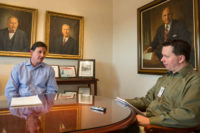Andy Hanacek, editor-in-chief: In terms of the post-acquisition transition, when JBS first acquired Swift and began to assimilate it into the global company, what were some of the first few things that started to happen around here?
Dooley: The first thing that I noticed was the emphasis on organization and on people. Wesley [Batista, president and CEO of JBS S.A.’s global operations,] placed a great deal of focus on the people and the organization straight away. Back in those days, prior to Wesley arriving here, the Swift organization was layered. Those multiple layers in the organization created a number of challenges, mostly with decision-making.
The first thing JBS did was separate the beef business, the pork business and the transportation business [into individual business units]. Then the organization was flattened, so we didn’t have a series of reports between the president of the business unit and the salesperson, for example. [That change] was pretty immediate.
When we flattened this organization, there was a very clear definition of what you were responsible for, what the expectations were. Therefore, it freed up people who had been encumbered by this massive bureaucracy to make decisions better and more quickly.
Hanacek: Was that organizational flattening limited to the corporate level or did it extend down into the plants too?
Dooley: The plant levels were fairly flat. We had always done a pretty good job of managing that. Remember, [HM Capital] attempted to put the beef and pork business units together, with the thought process of [being efficient and saving costs]. In fact, the exact opposite happened, mainly because you didn’t have an expert [on both]. So the person running the beef and pork operation [might not] know anything about pork operations. So, that person had to hire a pork operations expert anyway.
Hanacek: What were the differences in the investment mindset during the transition? Then, once you emerged from that and got into building this business out, what were some of the major changes and innovative investments that you began to make in your business unit?
Dooley: We had probably six years of minimal investment in the plants from 2001 to 2007. Investment was at a minimum, but that changed under JBS. So, the biggest opportunities, of course, were all these areas where we were not investing, but automation was improving; the technology was improving.
So we’ve been able to improve via automation, and primarily via the use of vision systems — for more precise trimming of the product as well as material handling. A lot of our material handling now is such that, once the box is packaged, it doesn’t need to be touched by human hands until it arrives at the customer. Vision technology is helping with safety, labor and yield.
Hanacek: Was there a point during the assimilation process, at which you saw something or heard something that made you feel as though your team was full on board with buying into everything JBS was bringing to the table?
Dooley: We may have had a little different situation in pork, because we were having a fairly decent amount of success even to that point, and we weren’t as heavy as far as the layering in the organization goes. But there was a point that was pretty well-defined, I think, for everyone [who was part of Swift], and that’s the point when Wesley decided to put the second shift back on at the Greeley beef plant. That sent a message to the team and to the industry that we’re here to stay. We’re here to compete and we’re in this deal for the long haul. At that moment, I think that was probably a realization for the [team members], and they said, “OK, we’re going to fight, so let’s put the gloves on and here we go.”
Hanacek: So pork was really stable before and through the transition and has been stable and growing since, even though prior to the acquisition it was stagnant because of the lack of investment?
Dooley: We had a stable senior-management team that stayed through that HM Capital period — although several of us were pulled into beef for a while. So from that standpoint, we probably lost some strategic positioning, but on the day-to-day, we were fine.
Hanacek: How has business been for your business unit, and what are some of the things you’re working on now to grow?
Dooley: We’ve had three really strong years. But there’s a number of challenges. ... The industry’s come off of three really good years [as well]. The exports have been massive for the industry, the last five years in particular. For us, we want to be the best, so there are opportunities to grow the top line and the bottom line for us.
Hanacek: How does the Marshalltown, Iowa, facility — which I’m going to be visiting for this story — stack up today? Is it a good example of the changes that have occurred here since the transition into JBS?
Dooley: We’re very proud of it. We’ve had a manager over there now for four years, Troy Mulgrew, who has done an absolutely fantastic job changing the culture at the plant. He came in to a pretty tough situation, did a lot of things I think to improve the atmosphere for the hourly employees in particular, as well as for the management team. They’ve done simple things, such as investing in new locker rooms, investing in better cafeterias, improving the quality of the food, improving the lighting in the plant — pretty simple things that cost money, but we think we’re getting a payback on it. It’s a place now where I think people are proud to work.






